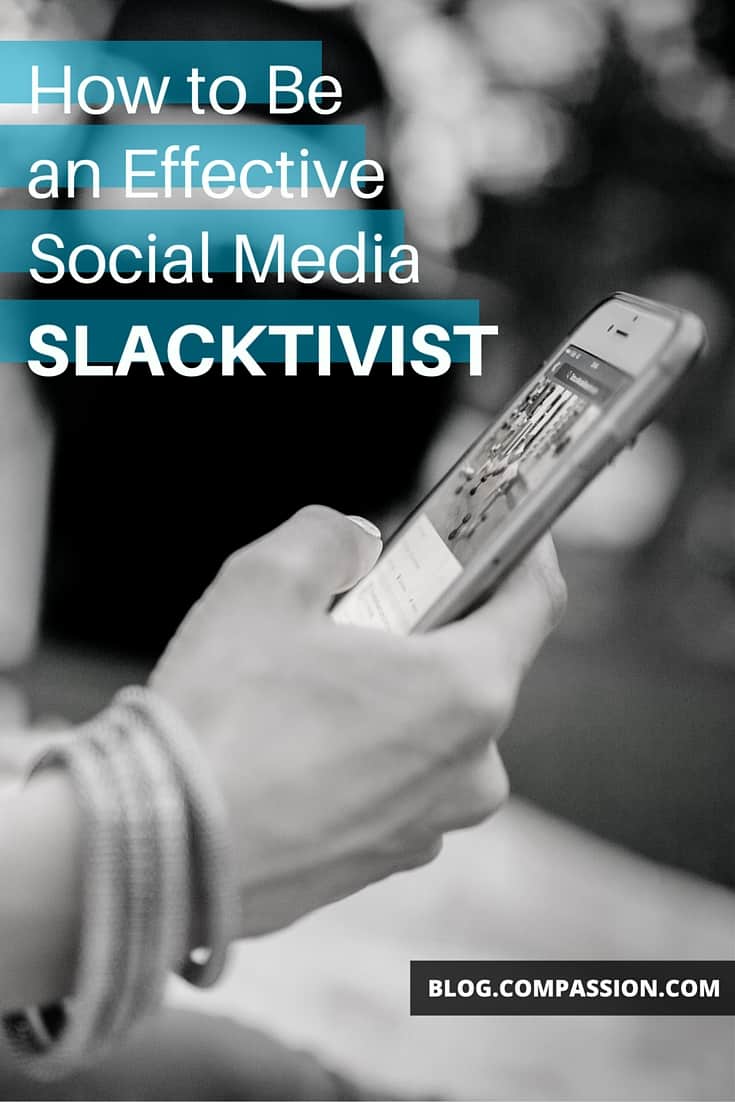Gone are the days when I hear about tragic news from television. It starts with one breaking-news tweet; and then a friend shares an article on Facebook. Next thing you know, my feeds are filled with nothing but the latest global crisis or social cause that is trending.
It gets overwhelming. It’s an overload of information about God’s hurting creation that is quickly followed by a feeling of helplessness or a burning desire to do something.
As the 21st century people we are, “doing something” looks a lot like using the megaphone of social media.

We shout at the world from Facebook, Twitter and Instagram with indignation. We share our opinions and links to news stories we think everyone needs to see. We change our profile pictures in support of the victims. Anything to say to the world: I care. This. This matters!
We’re not naive enough to think that changing a profile picture or tweeting that social activism hashtag will change the world. However, it’s one way to stand with humanity and say: We care.
This concept of slacktivism, of expressing support for a cause solely through social media, has been both criticized and praised.
Critics argue that slactivism (sometimes known as hashtag activism or vanity activism) is ineffective, doing nothing more than making the supporter feel like they have contributed. They cite movements like #BringBackOurGirls as reductionist and as having little impact. While they may have raised awareness, they boiled down a complex social issue to a hashtag without leading to tangible ways to address it.
Yet, fans of hashtag activism point to movements like #ALSIceBucketChallenge as evidence that not only does slacktivism spread awareness that gets people to take action, it can actually lead to raising a significant amount of money to advance a cause.
As our modern-day water cooler, social media can be a powerful tool where hearts can be moved and lives can be changed. But how can we turn our sympathy and empathy into more than just a like or share? How do we use social media well for something we’re passionate about?
Before you post, re-tweet or change your profile picture, consider these ideas on how to be an effective social media slacktivist.
1. Pray.
As I did my own soul-searching on how and why I use social media, this is the number one thing I kept coming back to – the thing I’m challenging myself to do and ask you to join me.
Pray for the broken-hearted, the victims, the widow and orphan, the refugee and the impoverished. Pray for the oppressors, the enemies and the perpetrators. Pray for the governments and organizations mobilizing to act.
Then pray if YOU should take action and if social media is the right tool.
Meditate on your motives for using social media and ask a few questions: Is this about me wanting people to see me as altruistic, belonging to the “correct” political party or a “good” Christian? Or is it about wanting to inspire others, raise awareness or take action in tangible ways?
2. Inform yourself.
There’s a learning curve to being a real advocate for a cause. Put in the time and effort to educate yourself before you re-tweet, share that link or use that hashtag. Your education goes a million miles to changing hearts when you can be trusted as knowledgeable.
3. Not all opinions need to be shared.
Filling your Facebook feed, tweeting up a storm or commenting on posts with strong opinions about everything and anything is a sure-fire way to lose credibility with your friends and followers.
It’s easy to sit behind a screen and say whatever you like to an anonymous world. Imagine speaking to one person sitting in front of you. Why are you sharing this with that person? Is your opinion coming from a knowledgeable place? How would you temper your words with God’s grace, wisdom and love?
4. You can’t care about everything.
Compassion fatigue is a real thing. And more importantly, you can’t actually solve all the world’s problems. Pick one or two and dig deep. Make tangible efforts to support it. Give of yourself with time, money or services, and then become a social media advocate.
5. Don’t be an alarmist.
Speak intelligently, not angrily. Speak with passion, not with vitriol. Speak with compassion, not hatred. Point people to accurate information to support your passion.
6. Share your story.
Chances are there’s a real and personal reason why you care so deeply about this cause. Tell people why. Be vulnerable. Connect hearts not just heads.
7. Before you hit “Send,” pray AGAIN.
You have an opportunity to use social media to share God’s heart for His creation. The next time you want to speak up for a cause, pray, dig a little deeper and take the “slacker” out of slacktivist by using the tools that you have well to affect change.
This article was originally published May 17, 2016.








8 Comments |Add a comment
Thank you Shannon for the information you gave to Christine’s question. I am a new sponsor and had the same question. I will share with my close friends the wonderful little girl I am now sponsoring.
On today’s blog; much to think about when we share on social media. Thank you.
Very good insight. I will take this into consideration when on any media site! Thank you for the interesting perspective!
Everything we do should include praying and I have not done it on FB! Will start a new way of looking at it and posts.
I have a question. Is it OK to share our sponsored child’s photo on FB and other social media? I would not use her last name, parent’s name, center’s name, etc. Thank you.
Hi Christine,
You are more than welcome to share your precious child’s photo on social media! We encourage our supporters to share their experience, and maybe this will help others become interested enough to sponsor, as well! 🙂 -Shannon
Thank you for your response!
Such a great post. I’ll be sharing it with others and hopefully they’ll do more than simply ‘like’ it.
The main role of the prophets of the Old Testament was not actually foretelling what was yet to come, but to express what God felt about the social ills man had brought about as a result of their own sins by identifying themselves with His indignation.
We are also reminded that behind His wrath there is also His sorrow and hope for redemption, because so corrupt and vile man may be, yet His love for them is everlasting and unconditional.
Yes, I am also very much incensed at the atrocities committed against the innocent and powerless by the Islamic State combatants that I hear and watch on news almost on weekly basis, and my own animal instinct is telling me that the only solution to the evil is human justice by means of military actions.
“My ways are not your ways, My thoughts not your thoughts”, says the Lord of Host through the equally indignant prophet Isaiah.
Likewise, Zechariah also identified himself with God by the similar abhorrence of the sword,
“Not by might nor by power”.
Anger is a normal part of our human emotion and it is natural that we become angry at injustice and we ought be, but we are called to sanctify our emotion because no matter how well-meant our anger may be, if unchecked, it could cause the secondly emotion which so often will lead to evil. Our anger does not bring about His righteousness (James 1:19).
Like the prophets, we are called upon to speak out on behalf of the oppressed and plundered, and against all the evil of the society.
Perhaps, our voice and testimony will become the most effective when we become aware that we truly possess compassion for the world and sympathy for the Heaven.
This is such a well written blog on a very current topic. Thank you for your insights and suggestions. Excellent work!